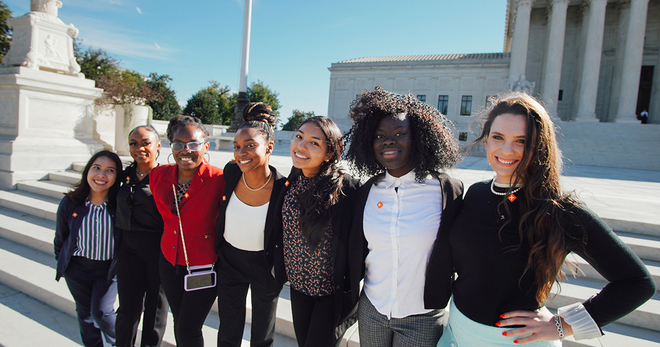Action needed: Strong tobacco 21 policies
Truth Initiative® has been, and continues to be, a strong proponent of raising the age to sell all tobacco products to 21. These policies have strong potential to save lives, considering almost all smokers start smoking before age 21.
A 2015 National Academy of Medicine (formerly the Institute of Medicine) report, commissioned by the Food and Drug Administration and required by the Tobacco Control Act, concluded that increasing the legal age to purchase tobacco products to 21 could decrease initiation rates among youth and young adults — especially among 15- to 17-year-olds, who would experience a 25% decrease in initiation, and among 18- to 20-year-olds, who would have a nearly 15% decrease in the initiation rate. This reduction or delay in initiation would also have an impact on overall smoking prevalence, as well as on the use of other tobacco products. Overall health, in both the short and long term, would improve by reducing tobacco-related diseases. Moreover, policies that raise the age of purchase to 21 have demonstrated an impact on the use of other substances. When all states raised the minimum age to purchase alcohol to 21, binge-drinking by high school seniors and traffic fatalities among young people both dropped.
There has been strong public support for raising the age for tobacco sales to 21, and states have been acting quickly to implement policies. To date, 12 states across the country and more than 450 localities have adopted policies, including six states in just the first four months of 2019. The passage of these policies is great news and support for tobacco 21 does not seem to be slowing down. However, there are a few disturbing developments that risk seriously undermining the full impact of these measures to protect public health. Now that public support has clearly reached a tipping point in favor of these laws, the tobacco industry has adopted the old adage, “if you can’t beat ‘em, join ‘em,” and now publicly supports tobacco 21 policies. Support for these policies grants the industry a public relations win by allowing them to appear to support solutions that protect youth. We have seen the industry actively employing this tried-and-true tool by taking out full-page newspaper ads across the country, touting its support for the policy. On its face, one might view industry support as a positive development, but as with most tobacco industry maneuvers, hidden dangers and self-serving agendas remain.
First, as the industry has begun to show support for tobacco 21 laws, we have seen the simultaneous development of policies containing provisions that weaken its impact. We also note tobacco 21 laws serving as a vehicle to weaken or distract support for other measures that are proven to reduce tobacco use, such as higher taxes or sales restrictions on flavored tobacco. For example, Arkansas passed a policy that included a provision prohibiting local government from regulating sales of tobacco products. Some recent laws, including those in Virginia and Maryland, exempt active duty military. A Utah law goes further, exempting military spouses and families. In Utah and Virginia, we have also seen laws that place the burden of enforcement on youth purchasers instead of where it belongs — on retailers who are profiting from the sale of a highly dangerous product that youth should not use. As the movement toward tobacco 21 laws continues, we strongly urge policymakers to avoid such provisions and enact strong laws designed to protect all young people.
Second, and perhaps more importantly, while tobacco 21 laws provide a useful tool to reduce youth tobacco use, they cannot be viewed as sufficient in and of themselves. In part, the tobacco industry about-face on this issue appears to be motivated by a desire to persuade policymakers from enacting other stronger policies (such as tax increases and strong clean indoor air laws) and fully funding state and local tobacco control efforts (including expansion of access to treatment and education programs for youth). A tobacco 21 policy alone — especially a weak policy — will not solve the tobacco problem. To truly embrace solutions that end the tobacco epidemic, policymakers should be using all available evidence-based policy solutions.
Features of strong Tobacco 21 policies:
- Eliminates existing and/or does not add possession, use or purchase laws, putting the onus on the retailer and not on purchasers/users under age 21
- Applies to all tobacco products and does not exempt any specific tobacco product
- Applies to all retail environments and does not exempt certain stores, restaurants, clubs, etc.
- For state-level laws, does not contain any language to preempt localities from enacting any type of tobacco control law
- Contains strong enforcement mechanisms, such as strong penalties for noncompliance, and has clear language about which entity or entities enforce the law (e.g., law enforcement, revenue, public health, multiple, etc.)
- Provides for the law to be implemented all at once on a specific date
- Does not contain exemptions (e.g., military personnel and their families, parents/guardians purchasing for minors, etc.)
Features that weaken Tobacco 21 policies:
- Includes punitive language for those under age 21 who possess, use or purchase tobacco, or provisions that deemphasize the responsibility of the retailer
- Applies only to certain tobacco products, such as only combustible products or only flavored tobacco products
- Contains exemptions for specific kinds of retail environments, such as grocery stores, clubs or restaurants
- For state-level laws, includes language that does not allow localities to enact stronger tobacco control laws (e.g., smoke-free environments, age to purchase, taxes, sales restrictions on flavored products) than the state
- Contains weak, confusing or nonexistent enforcement language, does not make it clear which entity or entities would enforce the law or does not have any penalties for noncompliant retailers
- Contains a phase-in period that raises the age of purchase to 19 or 20 by a certain date, and then raises it to 21 at a later date
- Contains military exemptions, especially if the exemption extends beyond active duty military to spouses or dependents, or exemptions for parents and guardians purchasing for minors
More in tobacco prevention efforts
Want support quitting? Join EX Program
By clicking JOIN, you agree to the Terms, Text Message Terms and Privacy Policy.
Msg&Data rates may apply; msgs are automated.



